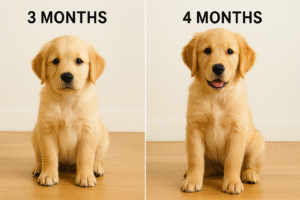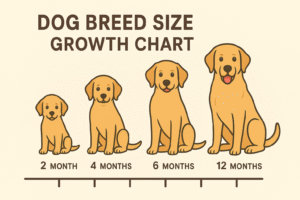Understanding Puppy Growth and Development
What Are Puppy Growth Stages?
Every puppy goes through predictable growth and development phases before reaching adulthood. These stages cover physical changes, behavior shifts, and critical training windows.
Puppy development starts at birth and lasts until about 12–24 months, depending on breed size. Small dogs often mature faster, while large and giant breeds take longer.
How Long Is a Dog Considered a Puppy?
-
Small breeds: Fully grown around 9–12 months.
-
Medium breeds: Reach maturity between 12–15 months.
-
Large and giant breeds: Can take 18–24 months to fully mature.
👉 See our full Puppy Care Guide for essential tips on raising your pup during these early months.
Why Puppy Milestones Matter
Tracking your puppy’s growth helps you:
-
Recognize when training or socialization should start
-
Identify potential health or behavior issues early
-
Provide proper nutrition for each stage
Puppy Growth Stages by Month (0–12 Months)
Newborn Puppies (0–4 Weeks)
-
Puppies are born blind and deaf.
-
Eyes usually open around 10–14 days.
-
First wobbly steps begin at 2–3 weeks.
-
Depend heavily on their mother for warmth and nutrition.
1–2 Month Old Puppy (5–8 Weeks)
-
Teeth begin to emerge.
-
Start weaning from mother’s milk.
-
Key socialization window opens—interaction with littermates teaches bite inhibition.
-
At 8 weeks, most puppies are ready to go to new homes.
👉 Related: Puppy Vaccination Schedule Simplified
3 Month Old Puppy Milestones (12–13 Weeks)
-
Energy levels rise dramatically.
-
Puppies begin teething in earnest—chew toys are essential.
-
Ready for basic training: “sit,” “stay,” and crate training.
-
Start leash introductions.
How to Teach a Dog to Sit Step by Step
4 Month Old Puppy Development
-
Baby teeth start falling out.
-
Behavior becomes more independent.
-
Puppy may test boundaries (“teenage” phase starts).
-
Growth spurt is common.

5 Month Old Puppy Stage
-
Adult teeth almost fully in.
-
Increased coordination and play drive.
-
Training consistency is key—recall and leash manners should be reinforced.
Recall Training: Teaching Your Dog to Come Every Time
6 Month Old Puppy (Adolescence)
-
Sexual maturity begins (spaying/neutering may be discussed).
-
Testing dominance and independence.
-
Training setbacks are common—patience is essential.
What to Expect from a 6 Month Old Puppy
7–9 Month Old Puppies
-
Still growing rapidly, especially medium to large breeds.
-
May develop destructive chewing habits if not given outlets.
-
Consistency in training prevents bad habits.
10–12 Month Old Puppies
-
Transition into adulthood.
-
Energy levels begin to balance out.
-
Breed size determines if puppyhood ends here or continues.
👉 Related: Dog Training for Beginners
Puppy Growth Charts by Breed Size
Small Breeds (Chihuahua, Yorkie, Toy Poodle)
-
Reach adult size by 9–12 months.
-
Weight: 3–15 lbs depending on breed.
Medium Breeds (Beagle, Cocker Spaniel, Bulldog)
-
Maturity around 12–15 months.
-
Weight: 20–50 lbs.
Large Breeds (German Shepherd, Labrador, Golden Retriever)
-
Growth continues until 18 months.
-
Weight: 55–80 lbs (on average).
Giant Breeds (Great Dane, Cane Corso, Mastiff)
-
Can grow until 24 months.
-
Weight: 100–200+ lbs.

Puppy Growth and Training Milestones
Socialization Milestones
-
Expose puppies to different environments, people, and pets between 2–4 months.
-
Positive reinforcement builds confidence.
Feeding Milestones
-
2–3 months: 4 small meals daily.
-
3–6 months: 3 meals daily.
-
6+ months: 2 meals daily.
👉 Related: Puppy Feeding Schedule for 8-Week-Old Puppies
Potty Training Timeline
Most puppies can be house-trained by 4–6 months with consistency.
Puppy Potty Training Tips
Teething Milestones
Expect teething from 3–6 months. Provide chew-safe toys.
👉 Related: Puppy Teething Timeline and Relief Tips
Sleep and Exercise Needs
-
Newborns: 20+ hours/day.
-
3–6 months: 16–18 hours/day.
-
6–12 months: 12–14 hours/day.
Common Puppy Development Mistakes to Avoid
-
Overfeeding during growth spurts → leads to obesity.
-
Skipping early training and socialization → results in behavioral issues.
-
Assuming all breeds grow at the same rate → large breeds need extra time.
Best Tools and Resources for Puppy Growth & Care
-
Crates (for safe sleeping and training).
-
Interactive toys for teething relief.
-
Breed-specific growth charts.
Best Teething Toys for Puppies in 2025
Expert Tips for Supporting Healthy Puppy Growth
-
Schedule regular vet checkups and vaccinations.
-
Maintain a consistent training routine.
-
Provide balanced nutrition appropriate for breed size.
-
Use positive reinforcement to build trust.
👉 Related: Puppy Separation Anxiety: Causes and Solutions
FAQs about Puppy Growth Stages
How fast do puppies grow?
Most puppies double their birth weight in the first week and reach half of their adult size by 4–5 months.
When does the puppy stage end?
Small breeds may mature by 9 months, while giant breeds remain puppies until 18–24 months.
At what age is a dog no longer a puppy?
Generally between 12–18 months, depending on breed.
Do large breeds grow slower than small breeds?
Yes, large breeds grow more gradually and take longer to reach skeletal maturity.
How old is my puppy in weeks vs. months?
Multiply months × 4.3 to estimate weeks (e.g., 3 months ≈ 13 weeks).
Conclusion
Watching your puppy grow month by month is an incredible journey filled with milestones. From their first wobbly steps to their teenage testing phase, every stage builds the foundation for a happy, well-adjusted adult dog.
💡 Want to ensure your puppy thrives? Start with our Complete Puppy Care Guide for step-by-step help.

